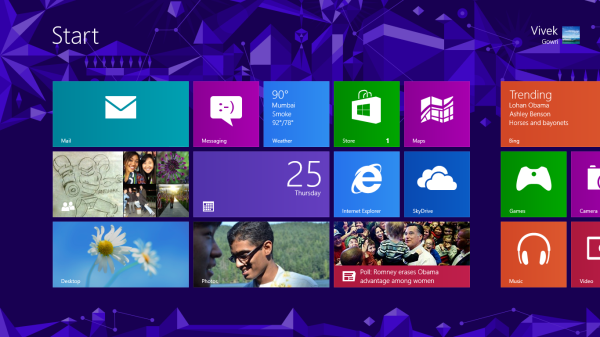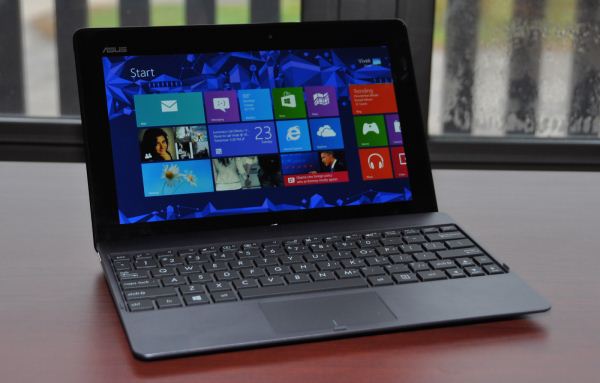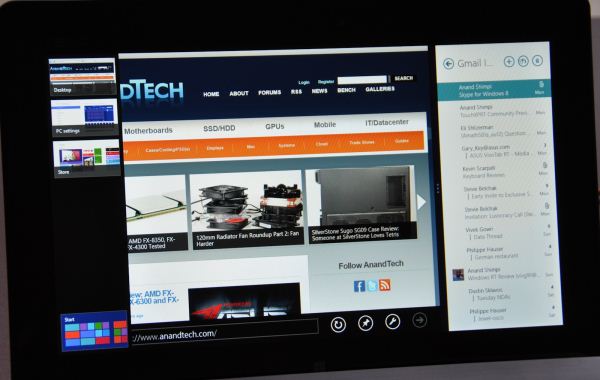The Windows RT Review
by Vivek Gowri & Anand Lal Shimpi on October 25, 2012 12:00 PM EST- Posted in
- Windows RT
- Operating Systems
- Microsoft
- Mobile
- Windows 8
- Tablets
Final Words
So, ten thousand words later, what can we take away from Windows RT? It’s definitely another superb user experience design from Microsoft. Say what you will about Windows Phone 7, but damn if that UI isn’t gorgeous. The Metro design language translates over to the tablet form factor really well, resulting in the Windows Modern UI. We’ve obviously known how Modern UI looks and feels through the various Windows 8 preview builds, but Windows RT ends up being more focused and offering a more consistent experience. It’s a side effect of being limited to apps from the Windows Store - because you spend a significant majority of your time in the new Windows UI, desktop use is minimized. In Windows RT, the Windows Desktop serves the purpose of being the more capable and powerful layer underneath the main portion of the UI, as opposed to Windows 8, which sometimes feels like the new Windows UI existing as an impractical interface layer on top of the traditional desktop.
The dichotomy just feels more comfortable in Windows RT than I feel like it has been in the previous Windows 8 systems that I’ve dealt with. It’s nice. This is the first time I feel like I’ve really connected with the new Windows UI, it makes a ton of sense to me now. I still think for mouse-based navigation, you’re better off treating it as a glorified Start menu, but it’ll be interesting to see how legacy programs affect the use of Modern UI in x86-based Windows 8 tablets as the Windows Store matures.
If you’re really concerned about the state of third-party apps, you just have to wait and see. I’ve seen a lot of snap judgements made about Windows RT in the last couple of days based on the dearth of good applications in Windows Store, and while I agree with that sentiment, I feel like it’s extremely shortsighted to write off the ecosystem already. Neither version of the OS has gone on sale yet, and we know that there are a number of applications that will go live on the official release date, as well as many more coming in the weeks ahead.
This isn’t like Windows Phone, where we need to see whether the platform will get any market traction before predicting the growth of the app marketplace. You can basically assume that the marketplace will expand significantly unless somehow everyone stops buying Windows-based systems on October 26th. The odds of that situation arising seem relatively low, so my bet is that the strength of the ecosystem will be a non-issue a month from now.
The default inclusion of Office 2013 and the emphasis on physical keyboards makes Windows RT the first tablet platform to significantly address the question of productivity. Combined with the equally advanced task switching and multitasking built into the UI, and this becomes the first legitimately useful tablet operating system out there. The Galaxy Note 10.1 wasn’t bad, but it was a single device that built additional functionality into a custom Android skin. Every single Windows RT slate comes out of the box with Office and the ability to have multiple active application windows. It’s just a few steps ahead of competing tablet platforms at this point.
And it’s not like RT loses out on a content consumption front. It’s paired with what is a very strong entertainment store and gaming franchise in Xbox Live, and the browsing experience is definitely competitive. It’s also a competent e-reader, with Amazon’s Kindle being one of the headlining apps currently in Windows Store. It even matches the power efficiency of the other ARM-based tablets, with competitive battery life and standby time. Obviously, ARM is the driving factor in the low power consumption, but it’s good to see that Windows is on a similar level as iOS and Android.
So this is a tablet platform that can do a good job of replacing both an iPad and an ultraportable in a number of different workflows. You get the best of both worlds, in some sense - Windows RT tablets have similar form factors to the iPad and leading Android tablets, and offer near-equal battery life, performance, and user experience, but they also give you the added benefit of strong productivity applications and the power of Windows Desktop. From a conceptual standpoint, almost anything you can do with an iPad can be done equally well (or close) on a Windows RT tablet, but the desktop-caliber office suite and versatile multitasking interface of Windows RT are impossible experiences to replicate on the iPad. It's not a perfect operating system by any means, but it brings a new dimension to the tablet space. So if you’re looking for a new tablet this fall, Windows RT deserves your consideration.













233 Comments
View All Comments
steven75 - Friday, November 2, 2012 - link
iPad 4-finger swipe is pretty damn fast. I'm not sure how it could be faster.eaanders22 - Thursday, October 25, 2012 - link
Microsoft has managed to clutter up what could have been a decent tablet with remnants of an aging operating system. Can you imagine Apple putting a few hooks to the OSX desktop into its iOS tablets that don't give much of the functionality of OSX? A DOS prompt in a tablet, give me a break!Let's face it. Tablets are basically big phone technology. They're not computers in any real sense. Apple recognized this. They had a successful phone and they configured a tablet from it. Doing any significant input or serious analysis on a phone or tablet is a non-starter. You need a decent keyboard and special purpose software for many different kinds of tasks a full blown computer can do.
There is a third approach. Windows and OSX have become beasts of the tech world with complicated user interfaces to give the flexibility and power to do complicated tasks. An alternative to the phone/tablet approach, which is basic output only driven, are devices like the Chromebook which relieve casual users of burden of complexity by doing most of the work in the cloud. This dramatically reduces the learning curve for new users and frees them of the busy work of backups, updates, and security considerations. It can mean cheap, light weight systems with no moving parts that perform both input and output in the simplest possible way. Novice users are put off by the complexity of full blown computers and even by the complexity of modern smartphones and tablets.
Microsoft could have been successful by keeping RT a tablet version of Windows Phone and coming out with a web based verson of Windows like Chromebook. These devices haven't taken off like tablets due to the fact that the user experience with phones easily transferred to tablets, while Google didn't have a base in the full blown computer world to build on. But, there is an audience out there, particularly new users and older users that are tired of putting up with the complexity, lag, and busywork associated with bloated full blown operating systems they don't need to do a little writing, emailing, and multimedia watching. The new $249 Samsung Chromebook that just came out sold out everywhere in a couple days. The new RT devices are twice as costly and twice as complicated to get up to speed on for people looking to continue their quite simple use of a computer for a little emaling, writing, and multimedia watching. Who needs a touch screen for that. It just gets in the way.
The Windows 8 systems are another story. There you get full computing power and the functionality of a tablet in one package. This will fit a wide audience of sophisticated computer and smartphone users.
Dorek - Friday, November 2, 2012 - link
"A DOS prompt in a tablet, give me a break!"Uh, I think it's awesome. It lets you do a lot that iOS could never, ever do.
Chromebooks are never giong to take off. Can you even sync an iPod to a Chromebook?
Shadowmaster625 - Thursday, October 25, 2012 - link
Eventually someone is going to release either a compiler or binary translator or emulator or something that lets you convert a visual studio project to RT. Or even run the x86 executable itself. Right? I should be able to compile my own sleep.exe and launch it from a batch file. How can they stop that, and why would they?andrewaggb - Thursday, October 25, 2012 - link
They might require all apps to be signed to be run. Any apps in the store could be signed by them and any apps that come with windows could be.It would really make it hard to get viruses etc but it would also stop compiling your own without going through the store.
I don't really know what measures are active though.
Jugklutzz - Thursday, October 25, 2012 - link
Hey Guys. Great review.Tablets play a huge base in cloud base storage. What are the options for mounting a NAS?
Best Regards,
Mike
mattlach - Thursday, October 25, 2012 - link
RT does nothing for me.Main reason I have not bought a tablet is because of both Android and iOS not being able to run full featured desktop software.
To me the brilliance of Windows 8 is what it does for x86 tablets, that can be both for full desktop use AND tablet use.
We don't need another limited tablet OS like Android and iOS. RT Is a complete waste IMHO.
THizzle7XU - Thursday, October 25, 2012 - link
"If you’re really concerned about the state of third-party apps, you just have to wait and see. I’ve seen a lot of snap judgements made about Windows RT in the last couple of days based on the dearth of good applications in Windows Store, and while I agree with that sentiment, I feel like it’s extremely shortsighted to write off the ecosystem already. Neither version of the OS has gone on sale yet, and we know that there are a number of applications that will go live on the official release date, as well as many more coming in the weeks ahead."Exactly what I was thinking when reading the complaints on The Verge and some other sites. They claim there are no apps, and I'm thinking...well, technically there is no Windows RT yet for anyone because it's not out yet! And as a developer, I know how they think. Why release something earlier than you have to? You want as much time as possible to work on code and QA. If no one but some media and beta testers don't have the OS yet, what's the rush to release a version 1.0 app? So these sensationalist pseudo-tech editors can rip your early app apart too?
nofumble62 - Thursday, October 25, 2012 - link
Apps launch time is too slow for my patience.Haswell convertible laptop would be a killer.
Tablet and laptop will converge next year.
gsurath - Friday, October 26, 2012 - link
Fantastic review. From this point of view I can now clearly see corporate boardrooms across the world with RT based tablets sitting on the desks. I can see people carrying them all around the office. I think that is where RT will win big. I see corporates creating their own RT apps for employees to access. This review along with Anand's on Surface reconfirms to me that Windows has just paved the way to dominate the office market for a few years to come. Will this mean that people will then use this single device across all their needs? No so sure given the number of gadgets we tend to collect, I still think will find a space. With Office 2013 for ARM being made available, Android too will have the capabilities of RT in the future. All in all, the future is interesting.